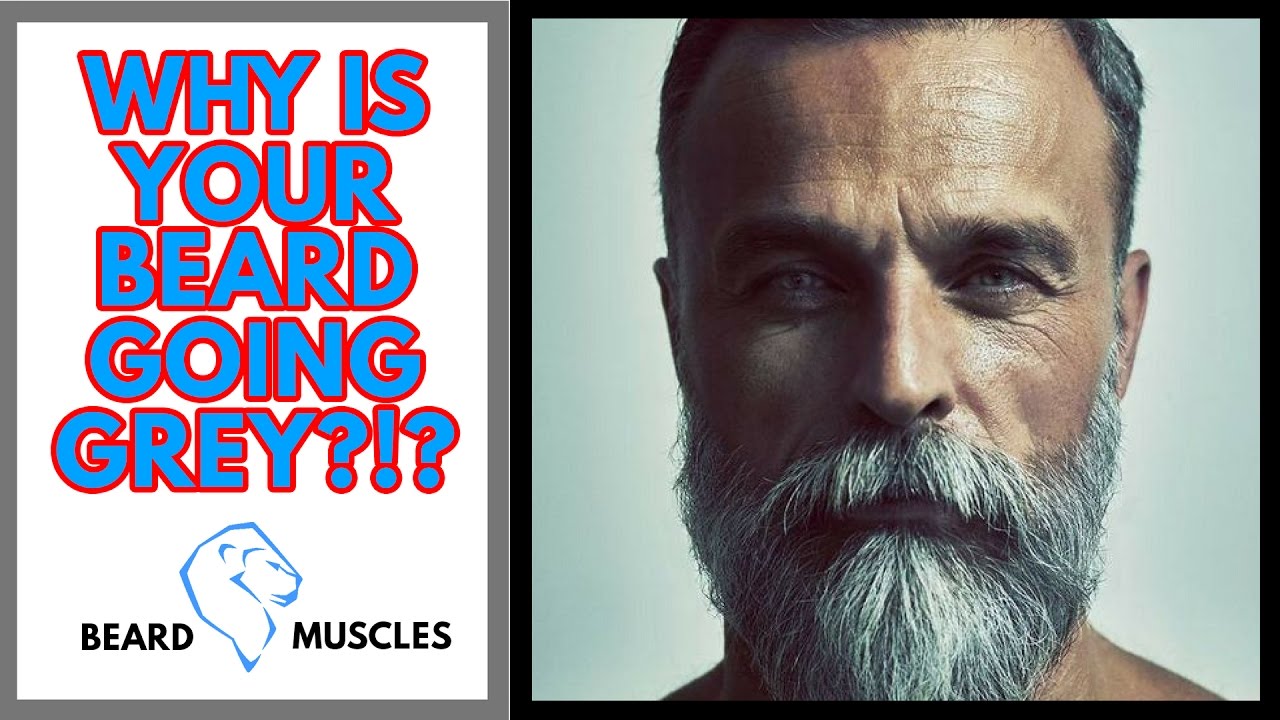In this article, we will explore the factors that can cause a beard to turn grey. You will learn about the natural aging process, genetics, and other potential causes that can contribute to greying facial hair. We will also discuss tips and techniques for embracing your grey beard and maintaining its health and appearance. So, if you’ve ever wondered why your beard is turning grey or how to embrace your greying facial hair, keep reading to find out more!
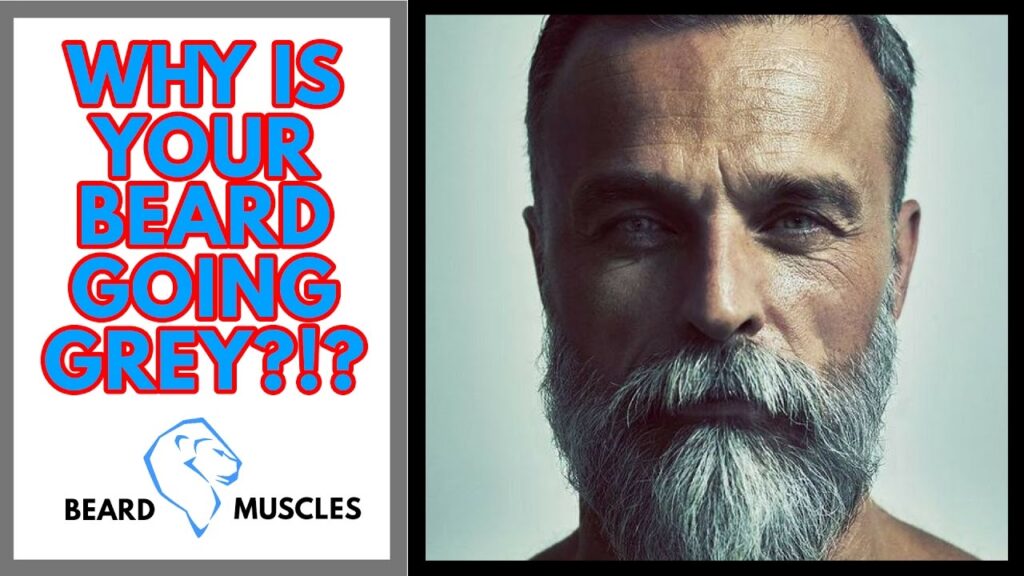
Introduction
Welcome to BeardsDude.com, your ultimate destination for all things beard-related. In this article, we will explore the fascinating phenomenon of beard graying. Have you ever wondered why your once luscious and colorful beard has started to display streaks of gray? We’ll uncover the science behind beard pigmentation and the various factors that influence graying. Additionally, we’ll debunk common myths and misconceptions surrounding gray beards, discuss preventative measures, and provide tips for maintaining and embracing your gray beard style. So, let’s dive in and discover what causes a beard to turn gray!
Understanding Beard Pigmentation
Melanin and Beard Color
To understand why beards turn gray, we first need to delve into the role of melanin. Melanin is the pigment responsible for the color of our hair, skin, and eyes. In the case of beard hair, the two main types of melanin are eumelanin (dark brown/black) and pheomelanin (yellow/red). The ratio and distribution of these pigments determine the color of your beard.
The Role of Genetics
Genetics plays a significant role in determining the color of your beard. The genes responsible for hair and beard color are inherited from your parents. If they possess genes for early graying, there’s a higher likelihood that you may experience premature graying as well. Additionally, specific genes influence the production and regulation of melanin, which can affect the rate at which your beard turns gray.
Age-Related Changes
One of the most common causes of beard graying is the natural aging process. As we grow older, our hair follicles produce less melanin. This reduction in melanin production leads to a decrease in beard color intensity, eventually resulting in the appearance of gray or white hairs. The age at which this process begins varies from person to person, but it is generally more noticeable after the age of 35.
Factors That Influence Beard Graying
Stress and Premature Graying
While stress is often blamed for premature graying, its direct relationship with beard graying is not fully understood. However, studies have suggested a possible link between chronic stress and accelerated graying. High levels of stress may cause disruptions in the body’s melanin production, leading to premature graying of the beard. So, while stress may not directly cause beards to turn gray, it can contribute to earlier graying.
Environmental Factors
Exposure to certain environmental factors can also contribute to beard graying. Studies have shown that prolonged exposure to sunlight and pollution can damage hair follicles and affect melanin production. Additionally, exposure to harsh chemicals in hair products or excessive heat from styling tools can also accelerate the graying process.
Health Conditions and Medications
Certain health conditions and medications can have an impact on beard pigmentation. Autoimmune disorders such as vitiligo, which cause the loss of skin color, can also affect hair color, including beard color. Additionally, some medications, such as chemotherapy drugs, can cause temporary or permanent hair loss and graying.
The Science of Graying
The Process of Hair Graying
To understand beard graying, it’s essential to comprehend the underlying process. Hair graying occurs when the melanocytes, the cells responsible for producing melanin, gradually lose their ability to produce pigment. As the melanocytes become less active or die, new hair follicles grow without pigment, resulting in gray or white hairs.
Effects of Oxidative Stress
Oxidative stress, caused by an imbalance between free radicals and antioxidants in the body, is believed to contribute to hair graying. Free radicals are highly reactive molecules that can damage cells and DNA. Over time, this damage can affect melanocytes’ ability to produce melanin, leading to the graying of beard hair.
Telomere Shortening and Graying
Another scientific theory suggests that telomere shortening plays a role in hair graying. Telomeres are protective caps at the ends of chromosomes that become shorter as cells divide. When telomeres become too short, cell division is no longer possible, leading to cell death. This process affects melanocyte stem cells, which results in a reduction in melanocyte activity and the graying of beard hair.
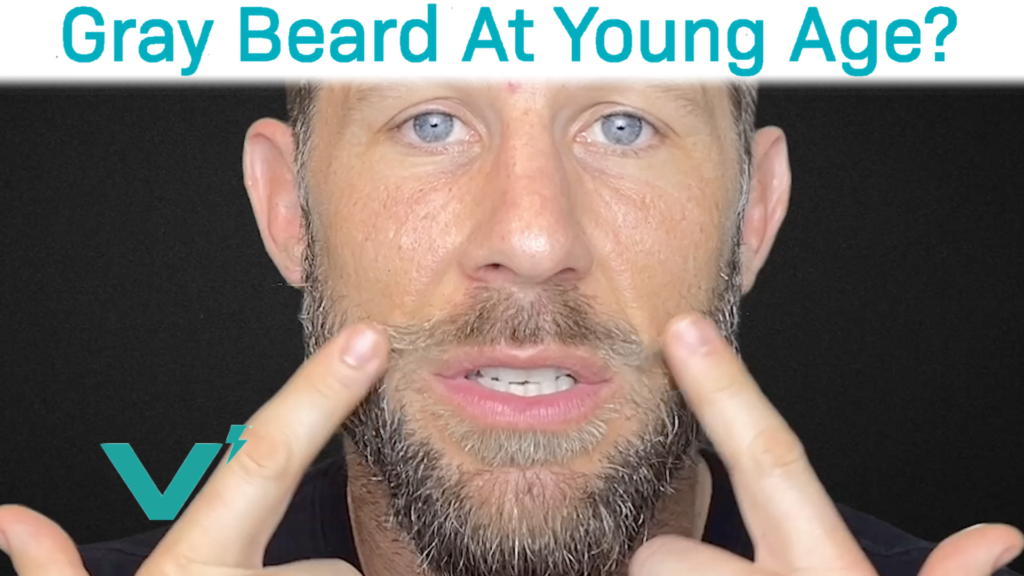
Myths and Misconceptions about Beard Graying
Plucking Gray Hairs
Contrary to popular belief, plucking a gray hair will not cause two to grow in its place. When you pluck a gray hair, a new hair will eventually grow in its place, most likely gray as well. Plucking can also cause damage to the hair follicle and lead to issues such as ingrown hairs or infections.
Beard Color Reversal Treatments
Numerous products claim to reverse beard graying, but most lack scientific evidence to support their effectiveness. While some products may temporarily darken the appearance of gray hair, they do not address the underlying cause or prevent further graying. It’s crucial to manage expectations and approach these treatments with caution.
Natural Remedies for Graying
A variety of natural remedies, such as herbal treatments or dietary interventions, are often suggested as a way to slow down or prevent beard graying. However, there is limited scientific evidence to support these claims. It’s important to remember that beard graying is a natural process influenced by various factors, and reversing or preventing it entirely may not be possible.
Can You Prevent Beard Graying?
Healthy Lifestyle Choices
While it’s not possible to completely prevent beard graying, maintaining a healthy lifestyle may help slow down the process. Eating a balanced diet rich in vitamins and minerals, exercising regularly, staying hydrated, and getting enough sleep can contribute to overall hair health. Additionally, avoiding smoking and excessive alcohol consumption may reduce oxidative stress.
Avoiding Stress and Damaging Habits
While stress may not directly cause beard graying, managing stress levels can contribute to overall hair health. Engaging in stress-reducing activities such as exercise, meditation, or hobbies can help maintain a healthy beard. Additionally, avoiding harsh styling practices, excessive heat, and chemicals can minimize damage to the hair follicles and reduce graying.
Use of Beard Care Products
Using quality beard care products can help maintain the health and appearance of your beard. Moisturizers, conditioners, and oils designed specifically for beard maintenance can nourish hair follicles, promote healthy beard growth, and minimize the appearance of gray hairs. Regular grooming and trimming can also help maintain a neat and well-groomed appearance.

Accepting and Embracing Beard Graying
Cultural Significance of Gray Beards
Gray beards have been historically revered and associated with wisdom, maturity, and experience in various cultures. Many societies have respected and admired elder individuals with gray beards for their knowledge and leadership qualities. Embracing your gray beard can be a way to honor these cultural signifiers and celebrate your own journey of personal growth.
Gray Beards as a Sign of Maturity
A gray beard can be a visible symbol of maturity and experience. It represents the passage of time and the wisdom accumulated throughout one’s life. Embracing your gray beard can be an empowering way to showcase your life experiences and establish yourself as a respected figure in your community.
Self-Confidence and Owning Your Gray Beard
Ultimately, accepting and embracing your gray beard is about self-confidence and pride in your appearance. Your beard is a unique expression of your individuality, and your gray hairs add depth and character to your overall look. By confidently owning your gray beard, you inspire others to embrace their own natural features and break free from societal beauty standards.
Beard Care Tips for Gray Beards
Moisturizing and Conditioning
Gray beard hair can be drier and more brittle compared to pigmented hair. Regularly moisturizing and conditioning your beard can help hydrate the hair follicles, reduce frizz, and improve overall manageability. Using quality beard oils, balms, and conditioners specifically formulated for gray beards can provide essential nutrients and enhance the appearance of your facial hair.
Proper Grooming and Trimming
Regular grooming and trimming are essential for maintaining a neat and tidy gray beard. Trimming can help get rid of split ends and promote healthier growth. It’s important to use sharp, high-quality beard trimmers or scissors designed for precise grooming. Additionally, beard combs and brushes can help distribute natural oils and keep your gray beard looking sleek.
Using Products for Gray Beard Maintenance
Gray beard maintenance products are specifically formulated to address the unique needs of gray facial hair. These products usually contain ingredients that reduce yellowing, enhance shine, and enhance the natural silver tones of your beard hair. Incorporating these specialized products into your grooming routine can help your gray beard look its best.
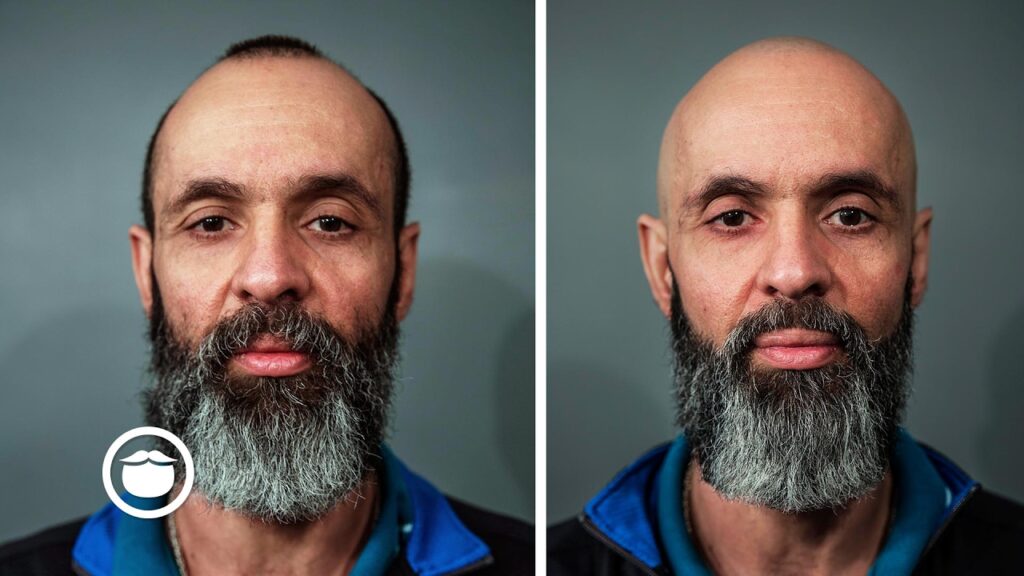
Coloring Options for Gray Beards
Beard Dyeing Techniques
If you’re not ready to fully embrace your gray beard, there are various beard dyeing techniques available. Permanent dyes can fully cover gray hair, while semi-permanent dyes offer a more temporary solution. It’s important to choose a coloring product specifically designed for facial hair and follow the instructions carefully to achieve the desired result.
Pros and Cons of Dyeing
Beard dyeing can temporarily restore your beard’s original color and help you achieve a more youthful appearance. However, it’s essential to be aware of the potential drawbacks. Dyeing can be time-consuming, expensive, and require regular touch-ups. It may also lead to skin irritation or allergies in some individuals. It’s important to consider these factors before deciding to dye your gray beard.
Natural Alternatives to Dyeing
If you prefer to avoid chemical dyes, there are natural alternatives available. Henna, indigo, and cassia powders can be combined to create a range of colors, including shades to cover gray hair. These natural options provide a more temporary solution and are generally gentler on the skin and hair. However, it’s important to perform a patch test and follow the instructions to achieve the desired result.
Rocking Your Gray Beard Style
Choosing a Beard Style for Gray Hair
Gray beards offer a unique opportunity to experiment with different beard styles and shapes. Whether it’s a full beard, goatee, or mustache, gray facial hair can add an air of sophistication and individuality to your overall look. Consider consulting with a professional barber to help you find a beard style that complements your face shape and personal style.
Accessorizing and Grooming Techniques
Accessorizing your gray beard can elevate your overall appearance and add a touch of flair. Beard ornaments, beads, or even beard oils with subtle fragrances can enhance your beard’s aesthetic appeal. Additionally, experimenting with different grooming techniques, such as straightening or curling, can help you achieve your desired look and showcase the versatility of your gray beard.
Celebrating Your Individuality
Above all, rocking a gray beard is about celebrating your own unique individuality. Your gray hairs represent a journey filled with experiences, wisdom, and personal growth. Embrace your gray beard and wear it with pride, knowing that it signifies the wisdom and maturity that come with age. Celebrate your individuality and inspire others to do the same.
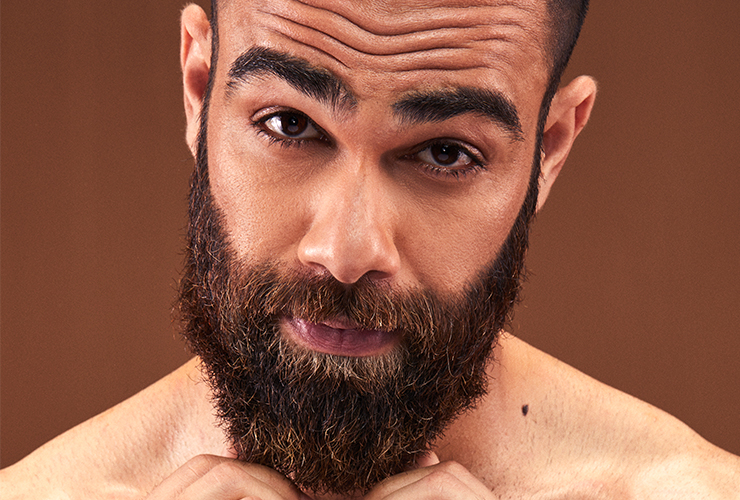
Inspiring Gray Bearded Celebrities
Celebrities Who Embrace Their Gray Beards
Gray bearded celebrities have become influential figures, often serving as style icons and trendsetters. Actors like George Clooney and Richard Gere have showcased the elegance and charisma of gray beards, proving that age and gray hairs can enhance one’s attractiveness. These celebrities have helped redefine the perception of gray beards, inspiring men of all ages to embrace their natural hair color.
Their Impact on Beard Culture
Gray bearded celebrities have had a significant impact on beard culture, challenging the notion that gray hair is synonymous with aging and decline. Their confidence and style choices have sparked conversations and empowered men to own their gray beards. The portrayal of gray beards in popular media has played a crucial role in changing societal attitudes toward facial hair.
Style Inspiration from Gray Bearded Stars
Whether it’s a well-groomed salt-and-pepper beard or a full-blown white beard, gray bearded stars provide endless style inspiration. From distinguished formal looks to rugged and casual appearances, these celebrities have shown that gray beards can be versatile and complement various fashion choices. Take cues from these style icons and create your own unique gray beard look.
Embracing Gray Beards in Different Cultures
Symbolism and Cultural Significance
Gray beards have held symbolic and cultural significance in civilizations throughout history. From ancient cultures to modern societies, gray beards have been associated with wisdom, leadership, and experience. In many cultures, the presence of a gray beard commands respect and signifies a profound understanding of life’s complexities.
Gray Beards as a Mark of Wisdom
Gray beards are often revered as symbols of wisdom and knowledge. It is believed that the accumulation of life experiences and learning gives individuals with gray beards a unique perspective on various aspects of life. In some cultures, individuals with gray beards are sought after for guidance and advice, their hair color being seen as a visual representation of their deep understanding.
Different Cultural Grooming Traditions
Beard grooming traditions vary across different cultures and often hold cultural and religious significance. In some societies, men with gray beards are required to follow specific grooming rituals as part of their religious or cultural customs. These traditions reinforce the importance of maintaining and respecting the gray beard as a symbol of age, wisdom, and cultural heritage.
Frequently Asked Questions about Beard Graying
Does Stress Cause Gray Beards?
While stress is often associated with premature graying, research has not definitively proven a causative relationship between stress and beard graying. However, chronic stress can contribute to premature aging and affect overall hair health, potentially accelerating the graying process. While managing stress is important for overall well-being, it may not directly prevent beard graying.
Can Gray Hairs Turn Back to Their Original Color?
Once a hair follicle produces gray hair, it is unlikely to revert to its original color. Gray hairs lack pigment, and the melanocytes responsible for producing pigment in the hair follicle become less active or die over time. While certain treatments may temporarily darken the appearance of gray hairs, they do not address the underlying cause or permanently restore the original color.
Is It Normal for Young Men to Have Gray Beards?
While it is less common, some young men may develop gray beards prematurely. Premature graying can be influenced by a combination of genetic, environmental, and health factors. If you notice gray hairs in your beard at a young age, it’s advisable to consult a healthcare professional to rule out any underlying health conditions and discuss potential treatment or management options.
Conclusion
Beard graying is a natural and inevitable part of the aging process. The color of your beard is influenced by a combination of genetics, aging, and various environmental factors. While it may not be possible to prevent beard graying entirely, maintaining a healthy lifestyle, managing stress levels, and using proper beard care products can help preserve the health and appearance of your gray beard. Embracing your gray beard is an opportunity to celebrate your individuality and showcase the wisdom and maturity that come with age. So, whether you choose to rock your gray beard with pride or explore alternative coloring options, remember that your beard is a reflection of your unique journey and the experiences that have shaped you.
